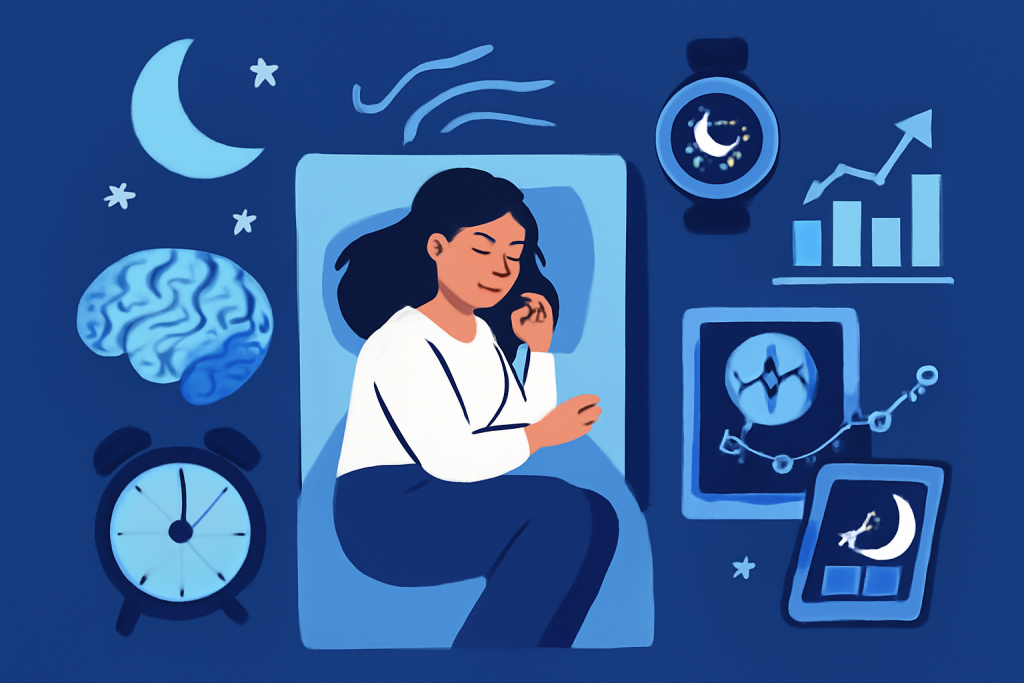Struggling to stay sharp and productive? New sleep science reveals how optimizing your sleep quality and timing can boost focus, creativity, and output—without drastic lifestyle changes. Discover cutting-edge insights and practical tips that are reshaping productivity in 2025.

Understanding the Link Between Sleep and Productivity
Sleep has long been recognized as essential for health, but its direct connection to productivity has become a major focus for researchers and businesses alike. Far from being a passive state, sleep actively supports cognitive functions crucial for effective work. When you sleep, your brain undergoes processes like memory consolidation, toxin clearance, and emotional regulation. These processes are vital for problem-solving, decision-making, and creativity—the pillars of productivity (Walker 2017).
Conversely, sleep deprivation disrupts these functions, resulting in decreased attention span, slower reaction times, and impaired memory. The National Sleep Foundation estimates that chronic sleep loss costs the U.S. economy over $400 billion annually due to lost productivity and increased workplace accidents (Hirshkowitz et al. 2015). This statistic alone highlights why understanding the science of sleep and productivity has become an urgent priority.
The Emerging Science of Circadian Rhythms and Work Efficiency
One of the most exciting developments in sleep research is the exploration of circadian rhythms—our body’s internal 24-hour clock that regulates not only sleep but also hormone secretion, metabolism, and alertness. Disrupting this rhythm by working at times misaligned with your natural biological clock can cause “social jetlag,” a phenomenon akin to crossing multiple time zones without leaving home.
This misalignment can reduce daytime alertness and cognitive function, leading to reduced productivity. Researchers advocate for personalized work schedules that accommodate individual circadian preferences—early risers or “larks” perform best in morning hours, while night owls peak later in the day (Wittmann, Dinich, Merrow, & Roenneberg 2006).
For workplaces, embracing flexible hours based on circadian science is becoming more than just wellness talk; it’s a productivity strategy. Companies piloting such approaches report improved employee engagement, creativity, and reduced burnout. This trend marks a shift from a one-size-fits-all 9-to-5 schedule to a more nuanced approach that respects human biology.
Sleep Quality Over Quantity: Why Deep Sleep Matters More Than Ever
While the amount of sleep is important, the quality of that sleep, particularly the duration of deep sleep stages, is emerging as a critical factor for productivity. Deep sleep, also known as slow-wave sleep, is when the brain restores itself and strengthens neural connections essential for learning and memory.
Studies show that even if total sleep time is adequate, poor deep sleep due to stress, poor environment, or disrupted circadian rhythms can impair cognitive functions (Mander, Winer, & Walker 2017). This insight has fueled a surge in products and practices aimed at improving sleep quality, from specialized mattresses to mindfulness exercises.
Understanding this shift can help individuals focus not just on sleeping longer but on sleeping smarter, creating an environment conducive to uninterrupted deep sleep cycles.
Sleep Tracking Tech: From Wearables to Smart Mattresses
Technology is playing a transformative role in making sleep optimization accessible. Modern sleep trackers go far beyond basic sleep duration. Devices like the Oura Ring, Fitbit Sense, and Withings Sleep Analyzer monitor heart rate variability, respiratory rate, sleep stages, and environmental factors like noise and temperature.
These metrics give users personalized feedback, helping them adjust behaviors such as bedtime routines, caffeine intake, or bedroom setup. More impressively, some wearables integrate with apps that use AI to offer tailored sleep coaching, which has been shown to improve sleep efficiency and daytime alertness significantly.
Some companies now incorporate sleep tracking into their employee wellness programs. Research published in the Harvard Business Review indicates that organizations implementing sleep-focused wellness initiatives see up to a 20% increase in employee productivity and a reduction in sick days (Harvard Business Review 2024).
Practical Sleep Hacks Backed by Science to Boost Daily Productivity
Improving your productivity through better sleep doesn’t require becoming a sleep expert overnight. Here are proven strategies that anyone can apply:
- Maintain a Consistent Sleep Schedule:
Going to bed and waking up at the same time daily—even on weekends—strengthens circadian rhythms and leads to better sleep quality and daytime focus (Hirshkowitz et al. 2015). - Limit Exposure to Blue Light in the Evening:
Blue light from phones, tablets, and computers suppresses melatonin production, delaying sleep onset. Using blue light filters or avoiding screens 1-2 hours before bedtime helps promote natural sleepiness (Chang et al. 2015). - Incorporate Short Naps When Needed:
Power naps lasting 10-20 minutes can enhance alertness and memory without causing sleep inertia, a groggy feeling after longer naps (Brooks and Lack 2006). - Create an Optimal Sleep Environment:
A cool (around 65°F or 18°C), dark, and quiet bedroom environment supports uninterrupted deep sleep cycles. Blackout curtains, white noise machines, and temperature control are effective tools (Basner et al. 2017). - Use Sleep Technology Wisely:
Smart alarms that wake you during light sleep stages reduce morning grogginess and improve readiness for the day’s challenges (Ogilvie and Harsh 2014).
Future Trends: Personalized Sleep and Productivity Plans
The future of sleep science lies in personalized interventions combining genetics, lifestyle, and environmental data. Emerging apps use AI algorithms to create individual sleep profiles, recommending optimal bedtimes, light exposure schedules, and diet modifications tailored to your biology.
Chronotherapy, the practice of aligning work tasks and schedules with personal circadian peaks, is gaining traction. Imagine tackling complex analytical tasks during your peak cognitive hours and reserving routine work for lower-energy periods—this could dramatically enhance productivity and job satisfaction.
Furthermore, advances in non-invasive brain stimulation and pharmacology aimed at enhancing deep sleep are under investigation, promising new tools to optimize brain restoration and productivity.
Conclusion
The science of sleep and productivity is shifting from simple advice to a detailed understanding of biological rhythms and sleep quality. By aligning your schedule with your circadian rhythm, improving deep sleep, leveraging technology, and adopting practical sleep habits, you can significantly enhance your focus, creativity, and overall productivity.
As the research continues to unfold, one thing is clear: sleep is not an obstacle to productivity but its most powerful enabler. Prioritizing and optimizing sleep should be a core strategy for anyone looking to perform at their best in 2025 and beyond.
References
- Walker, M. (2017). Why We Sleep: Unlocking the Power of Sleep and Dreams. Scribner.
- Hirshkowitz, M., et al. (2015). National Sleep Foundation’s sleep time duration recommendations: methodology and results summary. Sleep Health, 1(1), 40-43.
- Wittmann, M., Dinich, J., Merrow, M., & Roenneberg, T. (2006). Social jetlag: misalignment of biological and social time. Chronobiology International, 23(1-2), 497-509.
- Mander, B. A., Winer, J. R., & Walker, M. P. (2017). Sleep and human aging. Neuron, 94(1), 19-36.
- Chang, A. M., et al. (2015). Evening use of light-emitting eReaders negatively affects sleep, circadian timing, and next-morning alertness. PNAS, 112(4), 1232-1237.
- Brooks, A., & Lack, L. (2006). A brief afternoon nap following nocturnal sleep restriction: which nap duration is most recuperative? Sleep, 29(6), 831-840.
- Basner, M., et al. (2017). Auditory and non-auditory effects of noise on health. Lancet, 383(9925), 1325-1332.
- Ogilvie, R. P., & Harsh, J. R. (2014). Sleep inertia and the transitional state between sleep and wakefulness. Sleep Medicine Reviews, 18(6), 459-471.
- Harvard Business Review. (2024). How Sleep Programs Boost Workplace Productivity. Available at: https://hbr.org/2024/02/how-sleep-programs-boost-productivity (Accessed: June 2025).






